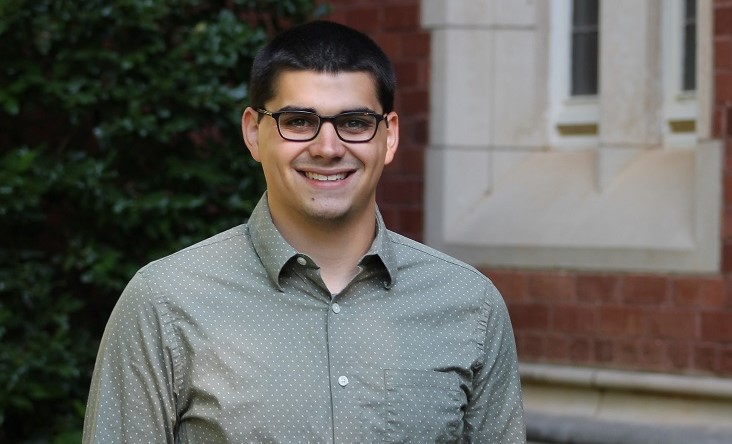
Hello, I’m Dr. Matthew Geras, an Assistant Professor of Political Science in the UIS School of Politics and International Affairs. Prior to joining the UIS community in 2020, I was a graduate fellow at the Carl Albert Congressional Research and Studies Center located at the University of Oklahoma in Norman, Oklahoma, which is where I obtained my PhD in Political Science.
My teaching and research focus on U.S. elections and American political institutions, including Congress, the presidency, and political parties. Specifically, my research looks at representation within American political institutions and how our institutions influence political participation, particularly who runs for office. A lot of my recent work pertains to representation in political parties. As part of my dissertation, I collected the bylaws of all 100 state-level Democratic and Republicans parties as well as biographical data on all state party chairs in order to consider whether the diversity of a party’s membership influences who runs for Congress. In an article published at Party Politics, I find that the degree of diversity in a state political party’s formal membership does influence who runs for Congress. During the 2018 midterm elections, Democratic women were more likely to run for Congress when representing a state party that granted party membership to an allied women’s group and when representing a state party chaired by a woman.
More recently, I have continued to collect data on who serves in leadership positions in state political parties. In one current project, I am working with a coauthor at Syracuse University to study the political and professional motivations of individuals who attend state party conventions. Specifically, we are interested in whether policy, partisan, professional, or personal goals motivate these individuals to attend state party conventions and whether these individuals have previous experience holding elected office. We will be presenting some of this research at the upcoming Midwest Political Science Association Annual Meeting in Chicago, Illinois.
Beyond my research on political parties, some of my other recent research has examined whether women and racial minorities are more likely to hold leadership positions in state bureaucracies when these positions are either appointed by the governor or elected by the public. My coauthors and I find that racial minorities are better represented in appointed positions, but the representation of women depends on whether the position in question deals with a policy area that is stereotyped as being feminine or masculine. Here, we find women are more likely to serve in elected than appointed feminine positions, such as secretary of education, but the opposite is true for masculine positions, such as agriculture commissioner. This line of research has been published at State Politics and Policy Quarterly, and the Journal of Women, Politics & Policy.
My research directly informs my teaching. This is perhaps best demonstrated by the classes I will be teaching this spring: PSC 409: Political Parties and Interest Groups, PSC 502: Methods of Inquiry, and PSC 511: Seminar in American Politics.
- In Political Parties and Interest Groups, among other things, we will consider the role of political parties and interest groups in shaping who runs for and is ultimately elected to office, which directly pertains to my research.
- In Methods of Inquiry, I use my experience as a researcher to guide students through the process of designing their own empirical research project.
- Finally, in my Seminar on American Politics, we will spend a week on each of our major political institutions: Congress, the presidency, the federal courts, and political parties and we will also spend several weeks discussing representation in American politics.
In fact, in almost any class you take with me, we will discuss the importance of descriptive representation, which is the idea that our government entities, whether that be Congress, state legislatures, the courts, or the bureaucracy, should reflect the diversity of backgrounds, experiences, and interests in society. This is important because most American political institutions lack satisfactory levels of descriptive representation.
Beyond these classes, at UIS, I have also previously taught PSC 402: Legislative Politics, PSC 406: The American Presidency, and PSC 451: Empirical Political Analysis. In the future I will also be teaching a master’s-level seminar on Congress and am particularly excited to be teaching a course on campaigns and elections next Fall. Since this class will take place during the 2022 midterm elections, one of my goals for the class is for students to research and monitor ongoing congressional campaigns throughout the semester. Another one of my goals for this class is for us to plan and host a campus event to educate the surrounding community on the campaigns and issues at stake during the midterm elections.



